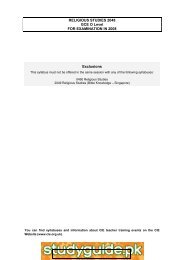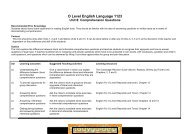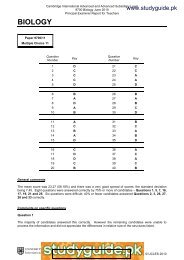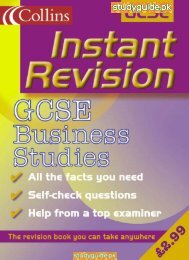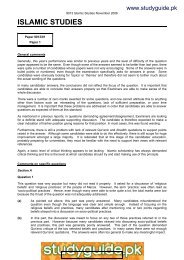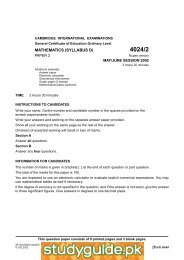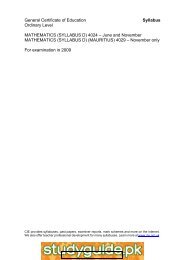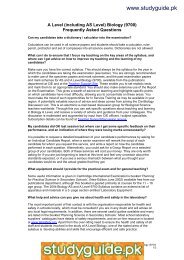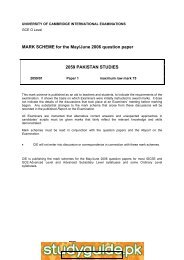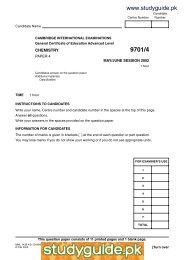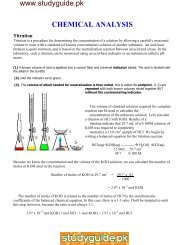GCE Advanced Level - StudyGuide.PK
GCE Advanced Level - StudyGuide.PK
GCE Advanced Level - StudyGuide.PK
- No tags were found...
Create successful ePaper yourself
Turn your PDF publications into a flip-book with our unique Google optimized e-Paper software.
understanding of the text. Copying wholesale from the text does not show such comprehension. Therefore,the candidate must demonstrate some ability to manipulate the linguistic material of the text. Even quitesmall changes will usually show that the candidate can handle the ideas as well as the language.Alternatively, candidates should show some explanation, by adding to or extending the quoted material.Other questions may be asked by Teachers preparing candidates for the exam:• How is copying from the text penalised?Examiners mark positively and are not looking for penalties. If, however, an answer consists of anextended quotation with no indication of understanding as explained above, credit cannot be gained andthe marks may not be awarded.• What about irrelevant material?It is very likely that an unselective answer will fail because of copying from the text. It is probablyalways the case that a candidate who follows this technique has not understood the specificity of thequestion or the relevance of the text and therefore is not demonstrating understanding.• What about the link between ‘content’ and ‘quality of language’?Quality of language marks are given globally for the whole performance on a set of answers toquestions. There is a necessary link between content and quality of language. If a candidate scores 0for all content, it would be impossible to give any mark for language. (If this were not true, any irrelevantor faulty set of answers could be rewarded.) Therefore, if individual questions score 0 for content, thefinal mark for language should be adjusted accordingly. The mark scheme gives more details of theway in which the balance of credit for language and content is achieved.With regard to Question 5, candidates lose marks if they write a general essay rather than a summary ofspecific points in the original passage. More will be said about this later in this report.The same 5-point language grid is used for assessing quality of language in each of Questions 4, 5 and 6.This means that candidates must maintain a good level of accuracy throughout the paper if they are to scorehigh marks overall.Comments on specific questionsQuestion 1This task provided a wide range of responses. Some candidates had no real problems relating the wordsgiven from the text to one of the definitions proposed. Others found great difficulty and were clearly guessingwildly. Most candidates managed to relate credo to conviction très forte, but spontanément and renchéritproved more demanding.Question 2Many candidates find this type of restructuring of sentences difficult, even when their performance in otheraspects of the paper is sound. Often, bits of the sentence are strung together with a complete disregard forgrammatical connections between words. The other main failing is to omit significant parts of therestructured sentence. This type of reformulation task is a strong test of grammatical knowledge and manycandidates found it difficult to score more than 1 or 2. Sentence (b) caused fewest problems, requiring onlythe use of an infinitive after On doit (tenter…). Sentence (d) also proved accessible. But the agreementafter preceding direct object in (e) proved problematic for many, as did the construction following chacun in(d).Question 3In general, the questions required a straightforward rendering of factual information from the passage, andcreated no real problems. This was particularly true of the questions under (a) and (c), which required alisting of specific features.Question (b) required more analysis, and candidates needed to use cependant, d’autre part or some similaradverb to indicate contrast between contradictory views.33



